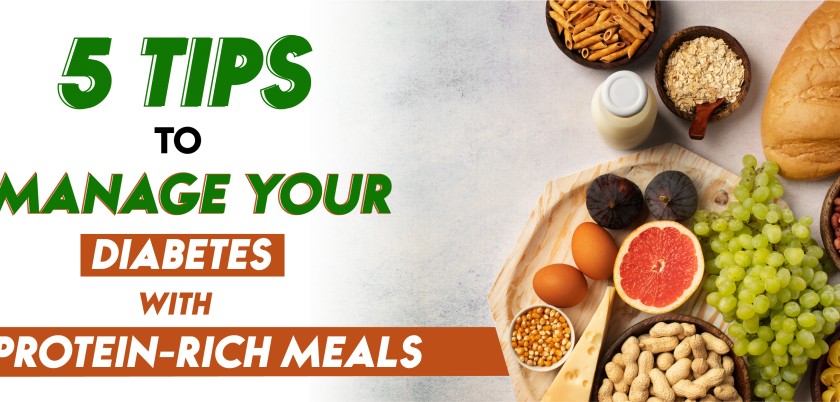
5 TIPS TO MANAGE YOUR DIABETES WITH PROTEIN-RICH MEALS
All the while focusing on ways to reduce your carbohydrate intake, ever wondered if a protein-rich meal can work wonders to manage your diabetes?
Indian Council of Medical Research (ICMR) has recently reported that increasing your protein intake to 20% of total kilocalories can help in the remission and control of diabetes.
If you are newly diagnosed with Type2Diabetes Mellitus then increasing your protein in the meal would be your best bet for reversing it.
WHY A PROTEIN-RICH MEAL?
When you consume a meal-rich protein, it helps in reducing the blood glucose level post-prandially. It improves insulin sensitivity and overall glucose tolerance.
THE RIGHT SOURCE
Yes, protein is important but does that mean you can load up from any source? Not exactly. Red meat despite being a good source of protein may not be the best choice for people with diabetes. This is attributed to the amount of saturated fat in them and other complications that could arise when consumed.
Plant sources, fish, and some lean cuts of meat are some of the best choices to meet your daily protein requirement.
Given below are the top 6 sources of protein that make your meal more wholesome.
1. PULSES AND LEGUMES
Pulses and legumes are commonly available protein sources and are our diet staples. Since it is not possible to meet your entire requirement with dhals it is important to have them in combinations.
Black and white chickpeas, moong dhal, urad dhal, and kidney beans rank higher in protein value among pulses.
One easy way to include more dhal is by combining half a cup of dhal with any of your vegetables and having them as a curry.
2. NUTS AND NUT BUTTER
Nuts are not just a good source of protein but are also loaded with other vital nutrients and antioxidants.
Consuming around 10- 12 pieces of nuts like almonds, walnuts and pistachio can meet a small portion of your protein requirement along with other minerals and vitamins.
Nut butter is another way to include proteins instead of sugary jams.
3. PANEER
In a vegetarian diet, paneer can be considered the best quality protein. You can get nearly 20grams of protein from 100grams of paneer. As a versatile ingredient, you can make any number of dishes from curries to tikka, and enjoy them.
4. SOYABEAN AND ITS PRODUCTS
Research has shown that soybean is a complete source of protein and a great substitute for animal sources.
One cup of soybean sabzi can help you cover a major part of your protein requirement per day.Soy milk, tempeh, tofu, and soy chunks are excellent sources of protein too.
5. GREEK YOGURT
Unflavoured and unsweetened yogurt are excellent additions to a diabetic-friendly diet. One cup of yogurt provides you with around 10grams of protein.
Yogurt is not only a good source of protein but is great for your gut health too. Good gut health helps in managing your overall nutrient metabolism.
You can make your yogurt more nourishing by adding low-glycemic fruits like berries, oranges, and pears.
6. EGGS, LEAN CUTS OF FISH, AND CHICKEN
Without a doubt, an egg is a complete source of protein with all essential amino acids. During any major meals or as a snack you can include whole eggs or egg white as preferred.
Lean cuts of fish and chicken are great sources too and can be taken in boiled, grilled, or shallow-fried form instead of deep frying.
In a non-vegetarian diet, eggs and poultry help you meet nearly half of your protein requirement per day.
The effect of protein in managing your blood glucose can be seen not only in overall glycemic control but also indirectly. A protein-rich diet keeps you satiated for a longer time and curbs hunger preventing you from overeating.
Choose your protein wisely from a variety of food sources to meet the requirement and for the benefit of other nutrients as well.






